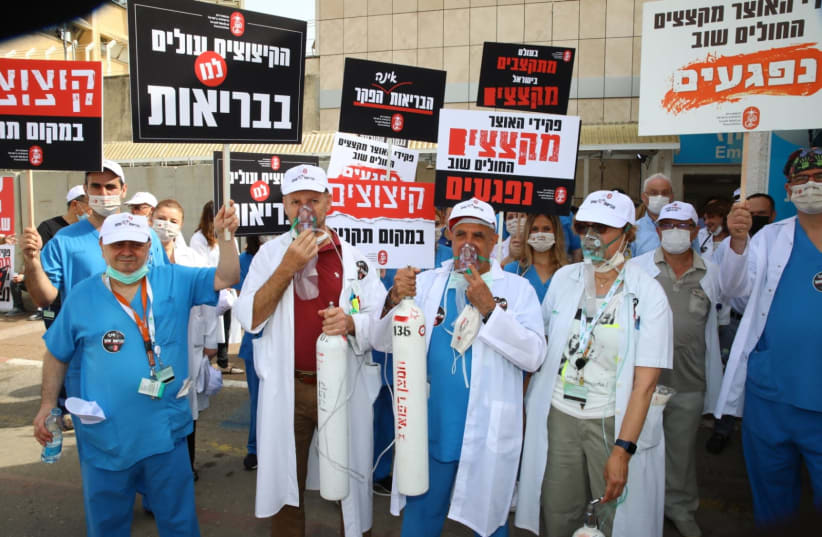Representatives of Israel’s physicians and of the Finance Ministry are planning to meet on Wednesday after hospitals, clinics and all civilian healthcare facilities went on strike Monday to protest the ministry’s decision to cut funding for the new personnel hired to fight against the coronavirus pandemic.
“A governmental vacuum cannot be an excuse for attacks against the doctors who work day and night for public health,” Israel Medical Association chairman Prof. Zion Hagay said. “The internal-medicine departments and emergency rooms are still over 100% occupied, and it is inconceivable that 600 doctors will now be fired while we are missing some 4,500 positions just to reach the average of the developed countries.”
When the pandemic hit, the healthcare system was already facing a high level of stress. According to the most recent available data dating back to 2018, Israel had 3.2 doctors per 1,000 citizens. The OECD average was 3.5.
The OECD provides internationally recognized standards and gathers data to monitor and create policies and best practices.
Some 600 physicians, many of them new doctors who were starting their residency, were hired after the coronavirus crisis began. The funding for their positions is due to expire on June 30.
The number of nurses in Israel also remains well under the OECD average, at five per 1,000 people, compared with nine per 1,000. There are also some 1,600 nurses whose contracts are not expected to be renewed.
Earlier on Monday, Health Minister Yuli Edelstein expressed his solidarity with healthcare workers.
“On this day my heart is with our doctors,” he said. “Their demand is highly justified. The Finance Ministry and the entire government are committed not only not to fire medical staff recruited during the coronavirus crisis, but to hire more.”
“Especially after the coronavirus year, we cannot just function in a ‘use and throw away’ modality,” Edelstein said. “The doctors together with the nurses and all the medical teams have fought 24/7 for the health of the citizens of Israel. Our response should be to increase funding, not to cut it.”
“Today, we launched a warning strike, and the emphasis is that it was a warning,” Hagay said. “It is time to take control and prevent further damage to the healthcare system. I would like to thank all the doctors who took part in the strike, and I have no doubt that the public is behind us.”
Healthcare staff rallied in front of hospitals all over the country on Monday morning. Healthcare facilities were set to operate in holiday mode just for emergencies for 24 hours, but the strike was interrupted after the country was targeted by rockets from the Gaza Strip at around 6 p.m.
